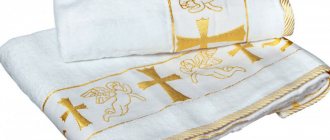Communion is one of the main sacraments of Orthodoxy. It is generally accepted that every Christian should regularly receive Holy Communion. The sacrament is performed in the church. You need to prepare for it in advance. The first time a Christian goes to communion is after baptism. It is generally accepted that the human soul, purified by communion and baptism, is protected by angels.
Who needs to confess
Confession before Communion is a necessary part of preparation for it. No one is allowed to receive Communion without Confession, except people in mortal danger and children under seven years of age. There are a number of testimonies of people who came to Communion without Confession - because priests, due to the crowds, sometimes cannot track this. Such an act is a great sin. The Lord punished them for their insolence with difficulties, illnesses and sorrows.
Women are not allowed to receive Communion during their period and immediately after childbirth: young mothers are allowed to receive Communion only after the priest has read a prayer for cleansing over them.
If an adult has been baptized, he must follow the rules of preparation for Communion, but there is no need to confess after Baptism, although it is possible. Baptism washes away all sins - it is in itself like Confession. If something weighs on your conscience, if you have any questions, confess.
Baptism is the door to the Church
Through the Sacrament of Baptism a person becomes a member of the Church of Christ. This is the first Sacrament with which the spiritual life of a Christian begins. In a conversation with Nicodemus, Jesus Christ reveals the importance of Baptism:
“Truly, truly, I say to you, unless one is born of water and the Spirit, he cannot enter the kingdom of God. That which is born of the flesh is flesh, and that which is born of the Spirit is spirit” (John 3:3-6).
Archpriest Seraphim Slobodskaya in his book “The Law of God” points out that the Sacrament of Baptism was established by our Lord Jesus Christ Himself, having been baptized by John the Baptist in the Jordan River. He commanded His disciples: “Go and teach all nations, baptizing them in the name of the Father and the Son and the Holy Spirit” (Matthew 28:19), thereby calling on the apostles to baptize the people who believed in Him.
Preparing a child for communion
How to prepare for your child's first communion? The sacrament requires adherence to strict rules in preparation. They are necessary for the complete purification of the human soul. However, it is difficult for children to comply with the necessary restrictions, so the rules for preparing for the sacrament are much weaker for them:
- Feeding. If the person receiving communion is an infant, it is recommended to feed him no later than 2 hours before the start of the sacrament. Older children should not eat during the day before communion. In this case, you should begin preparing for the sacrament in advance. In order for the child’s body to calmly withstand forced fasting, it is necessary to prepare it in advance.
- The first communion after the baptism of a child is the most important sacrament of Orthodoxy. During it, loud conversations, noise, and running are unacceptable. The child should be informed in advance about the basic rules of behavior.
- During the sacrament, the child and the adult who is holding the communicant baby in their arms must be
Adult Communion
Not everyone comes to Christ at a young age. Everyone has their own road to Orthodoxy. Increasingly, in churches you can see adults preparing to accept Christianity. Communion after the baptism of an adult is carried out in the same way as for children, on the second day after the sacrament.
However, more stringent requirements are imposed on adults during preparation:
- Sacrament of repentance. First, a Christian must undergo the secret of confession. Only after the remission of sins is he allowed to partake of the Holy Mysteries. However, if the sacrament is celebrated after the baptism of an adult, the sacrament of confession is not necessary. His soul is completely cleansed of sins during baptism.
- Observe strict fasting for 3 days. These days you should not eat meat or dairy products.
- Behavior. In addition to cleansing the body, before communion it is necessary to cleanse the soul. It is best to spend the preparatory days in prayer. It is also worth discarding all bad and evil thoughts.
The sacrament of communion is necessary for the salvation of the soul of every Christian. During its celebration, Divine grace descends on the Orthodox. The first communion after baptism is especially important for a person. It is at this moment that his soul opens to the spiritual world. Compliance with the basic requirements in preparation for the sacrament will allow the human soul to open the way to the world of spiritual grace.
Do people receive communion during Lent? What is the time of fasting for a Christian?
The question of how babies are given communion during Lent arises among parents no less often than others. This is due to the reluctance of people to break any of the church rules, which they simply do not know about.
What is Lent? Without a doubt, everyone, even those far from religion, knows that this is a time of giving up certain types of food and abstaining from entertainment. However, the time of fasting is not at all a period of following a peculiar diet and not the so-called “fasting days”.
Restrictions in food and lifestyle practiced during this period have only one goal - to focus the Christian on spiritual needs and problems. This time should be devoted to thoughts about the eternal, about the needs of the soul, about what is not given enough attention in the everyday bustle and everyday worries. During Lent, believers pay especially much attention to prayer and, of course, visit churches more often. And, of course, the sacrament of communion is celebrated on these days.
How do infants receive communion during Lent? Traditionally this is done after Saturday and Sunday church services. In general, the sacrament can be taken not only on weekends, but also on Friday and Wednesday. The sacrament itself performed during this period has no differences from the Eucharist celebrated on other dates.
First Communion after Baptism
The first communion after baptism is a whole event not only for the child, but also for his spiritual parents. During the sacrament, his soul will first open to heavenly powers. What do parents need to know about the timing of communion? It goes away after the child has been baptized. If the baby is still too young, many parents prefer to neglect the sacrament of communion or postpone it to a later date. The Orthodox Church does not approve of such behavior.
According to the rules established by the clergy, the communion of infants after baptism is carried out on the second day. Postponing it to a later date is highly not recommended.
Confession and communion for children
Preparing for Children's Communion
In the Catholic Church, a child's first communion is a real holiday. They are carefully preparing for this. But in time it happens much later than among the Orthodox.
In the Orthodox Church, infants receive communion at a very early age, immediately after the Sacrament of Baptism. Young children do not require special preparation for Communion. Infants can be given communion without an empty stomach; feeding them beforehand is not prohibited.
As the child grows, you should try to give him communion on an empty stomach.
But there is no specific measure of age for this; everyone has different degrees of endurance and maturation. But if the baby is capricious and asks for food, of course, there is no need to torture him and you should feed him before communion
. Otherwise, he may begin to hate the Sacrament and the Church itself.
Do I need to stay with my child for the entire service?
The child must be brought directly to Communion so that he does not disturb those praying with his cries or disturb the prayer atmosphere in the church. It is best to come with children after singing the Lord's Prayer.
Babies who do not have teeth are given Holy Communion only with Blood, since they cannot chew and swallow the Body of Christ. But adult children can already receive Communion with the Body. Therefore, there is no need to bring babies
. And those children who already have teeth and are able to swallow hard food can be given Holy Communion with the Presanctified Gifts. Each child has a different age.
What is the sacrament of Communion for children?
As children grow older, parents need to explain what Communion is. never tell your child that this is sweet water.
as some do. This way he will develop an incorrect understanding of the Sacrament.
If a child screams and refuses to take Communion, he should not be given Communion forcibly, against his will. Usually it is held tightly and Communion is poured into the mouth. This behavior is very dangerous both from a mental and physical point of view; the child may choke. And the unpleasant impression of the Sacrament will remain in his memory for a long time. You can simply leave the church with your baby, try to calm him down, and then try to give him communion.
After communion
After Communion, it is advisable to give the child a drink; an older person can be given prosphora.
What not to do after Communion:
· give the child a pacifier or breast immediately;
· forcefully pour in the drink;
· shake the baby (he may vomit).
If suddenly the child burps or spits out after Communion
, you need to carefully collect it in a scarf and then burn it. If there is a mark on clothing, it is advisable to burn it too. Therefore, it is better to put a bib on the baby before Communion (it is easier to destroy it later).
Confession of children
For children under seven years of age, the church charter prescribes communion without confession. But after reaching this age, the child must confess before Communion. It is better to prepare your baby for this important event in advance. We need to explain to him what the essence of the Sacrament is, to help him remember his sins. If a child can write (at least in print), it is better to write down sins on paper. This will make it easier for him, because children often get nervous during confession and find it difficult to say something. But usually the priest asks leading questions in this case.
How children receive communion in church
The first time the baby is brought to communion is 2 weeks after the baptism ceremony. Such mothers with babies are allowed to the sacrament first. If the baby is too capricious or is tormented by gas, it is permissible not to stand in the church throughout the liturgy, but to come directly to receive the bread and wine.
Children before they turn 7 years old receive communion without going through confession, from the age of 7 - only after a conversation with a priest, so that the sacrament does not turn into a formal procedure. Wine and bread are taken on an empty stomach, so children over 3 years old should exclude breakfast, but only if the baby is completely healthy. After the child reaches the age of 7 years, you can refuse dinner on the eve of communion.
As a rule, the sacrament occurs at liturgies, so parents need to know the schedule in advance so that the baby does not suffer for a long time waiting, since it is difficult for children with their energy to stand in one place for a long time. The communion itself in the temple occurs as follows:
- The priest brings out the Cup of wine and prays over it.
- The parishioners also say the same prayer, asking the Lord to bless the wine.
- Small children are held in their arms, older ones stand near their parents.
- The priest approaches each baby in turn and says the words: “The servant of God is receiving communion (the child or godparents say the baby’s name).
- Very young children are given holy water instead of Cahors, and older children - on the tip of a teaspoon of wine.
How long does a participle last?
- The duration of the communion itself will depend on the number of those eager to receive communion.
- After the end of the service, the priest takes out the Chalice with the Holy Gifts from behind the altar and invites those who wish to receive communion.
- First, church ministers and monks receive communion, and then children and everyone else are allowed through.
- While waiting for your turn, you cannot arrange a farce and showdown, otherwise all repentance will not make any sense.
- To taste the Holy Gifts (“Cahors”, prosphora, holy water or “warmth”), it will take less than a minute.
What wine is used when performing the sacrament?
Often, when parents ask questions about how babies are given communion in church, there is an interest in the type of wine. This is really important, since this drink, even when diluted, can cause an allergic reaction in a newborn.
As a rule, in most Russian churches, fortified dessert wines made from red grape varieties, for example, Cahors, are used to celebrate the sacrament of communion. However, the use of just such wines is not at all an unshakable rule.
Each locality has its own traditions of what wine will symbolize the blood of the Lord during the sacred rite. For example, in Greek churches they often give communion to parishioners with white wines or a mixture of them with red ones, while in Georgia “Zedashe” is traditionally used.
Accordingly, those parents who, for some personal reason, need to know what communion is given to babies in church should talk with the priest serving in the church where they plan to share the sacrament with their baby. There is no need to be shy about asking questions to clergy, especially if they are dictated not by idle curiosity, but by fears or doubts.
Communion after a child's baptism
Currently, the first Communion of a child after Baptism occurs at the end of the Sacrament of Baptism or in the coming days. However, parents and godparents should commune the child with the Holy Mysteries of Christ as often as possible (once a week or once a month). Communion after a child's Baptism should not be the first and last. You should take communion at least once a week on Sundays. It is very good when the whole family begins to take the Holy Chalice, becoming one in God. Saint Theophan the Recluse says: “If you find it possible to receive communion more often, it will not be bad.”
General information about the sacrament of communion
The Sacrament of Communion among the Orthodox is called the Eucharist, which literally translates as “thanksgiving.” By performing it, believers gain grace, through unity with Christ, and become the owners of eternal life. The procedure involves believers eating the Body and Blood of the Lord Jesus Christ in the form of bread and wine. As a result, a miraculous unity of people with God occurs. Understanding the sacrament of Communion prevails over the human mind and has a deep spiritual meaning.
After the baptism of a child, parents and godparents are entrusted with enormous responsibility for his spiritual life, so they must make efforts to obligatorily offer the child the sacrament of Communion.
If it is not possible to bring the baby to the holy chalice with Communion on the day of christening, it is better to do this as soon as possible.
Most priests advise giving communion to children at every Sunday service. It is advisable to share the Eucharist with your child, because this is a great blessing bestowed by the Lord himself, as well as the first step towards an active spiritual life.
How to prepare for communion?
In addition to questions about how many months a baby can be given communion and how the sacrament occurs, many parents are also concerned about how to prepare for participation in the Eucharist. In the Orthodox tradition, it is customary to pray, fast and confess before communion. Of course, this applies to adult Christians.
In the way infants are given communion, there can be no talk of any fasting, confession or preliminary prayers, because the child cannot help but eat, and he is not yet able to talk. But does this mean that there is no need to prepare for the sacrament? Not at all. Parents of a newborn prepare for communion, both for themselves and for the baby.
Quite a lot of questions arise in connection with the need for confession. Often parents of children do not understand why it is needed if they have not sinned. Indeed, those caring for newborn children have no time left for sins, but does this mean that they really did not happen? Sin is not only any action, but also thoughts and emotions. Irritation, anger, grumbling, despondency are sins. Confession is a way of repentance and cleansing of the soul. It is repentance that prepares the soul of a Christian to accept the grace that the sacrament of communion carries. Therefore, confession is a prerequisite for admission to the Eucharist.
As for immediate actions, for example, when to feed babies before the upcoming communion, neither the church nor the parents have a consensus on this matter. The process of preparing newborns for the sacrament is individual. The main thing is that the baby and his parents feel comfortable during the service and when receiving the Holy Gifts.
Often, young parents, focusing their attention on the questions of whether babies receive communion, when and how it is done, which is part of the process of preparing newborns to receive the sacrament, completely forget that there are other people in the church. If the baby is hot or cold, wants to eat or drink, needs to change the diaper, the child will start crying and screaming. The hysterical screams of children are not the best sound accompaniment for prayer; almost all believers present in the church hall are distracted by them. Therefore, it is extremely important before visiting the temple with a newborn in your arms to determine the optimal period of time between feedings, dress the baby in accordance with the temperature conditions and take a bottle of water and a pacifier with you.
Children traditionally begin to fast and confess at the age of seven. However, gradually accustoming children to restrictions should begin at an earlier age. If the family observes fasting and the parents themselves regularly receive communion, no special effort is needed.
Is it necessary to give communion to children? At what age should this be done?
There is a very widespread misconception that baptized babies must be given communion. This is not true at all. The sacrament of baptism does not impose an obligation on the parents of the child to bring him to the Eucharist. There are no regulations or decrees regulating the age at which infants receive communion in church. The decision on the participation of a newborn in the sacrament is made by the parents of the child. The priest can only explain to them the meaning of the rite of communion and tell them why they need to participate in it. A clergyman cannot force a person to take the Eucharist.
In pre-revolutionary times, when religion was an integral part of the life of every Russian, questions about when and how infants received communion after baptism and whether this should be done were not relevant. People came to church services, of course, young mothers had children in their arms. At the end of the prayers, all parishioners lined up for communion. Accordingly, the priest gave communion to both the child and his mother, as well as other people present in the temple.
That is, questions about the age at which infants receive communion did not arise, because the Eucharist was a traditional, integral and natural part of life. Newborn children who had been baptized received communion together with their mothers. Of course, there was no schedule for the frequency of participles either. At least once a week, on Sundays, newborns participated in the Eucharist, of course, if their parents attended the service.
In modern conditions, not all parents can afford to attend Sunday services every week. Not everyone understands why infants should receive communion. Church ministers do not oblige parents of newborns to participate in the sacrament. Even if the baby is in the arms of his father or mother, only adults can receive communion. Moreover, you don’t have to get up for communion at all. But when refusing to participate in the Eucharist with a child, we should not forget that a person’s habits are formed in his earliest childhood, when he is just beginning to learn about the world.
Fasting of an adult after christening
Retreat is a certain preparation for the Eucharist, consisting of reading certain prayers, fasting and repentance.
To speak correctly, you must follow the following rules:
- Healthy people and non-pregnant women should eat in moderation and fast, which involves excluding meat and dairy products and eggs from the diet.
- During fasting, read out the morning and evening prayer rules with attention and diligence.
- Study spiritual literature that is valuable for preparing for repentance.
- Refusal of entertainment and going to noisy places.
- It is more correct to read the canon of repentance to the Lord Jesus Christ, the canons to the Mother of God and the Guardian Angel, and the Rule for Communion during these 3 days.
- Reach agreement with the offended and offenders.
- It is necessary to confess in church at an evening service - All-Night Vigil or at morning Confession.
- Avoid eating and drinking after midnight and before the morning Liturgy.
Retreat is an integral part of the life of a Christian, necessarily preceding the sacrament of Communion.
How do adults prepare for communion?
Preparation for the Eucharist should begin several days before it is celebrated. A person who intends to receive communion in a proper manner must first observe sincere repentance and humility, acquire a desire to improve and lead a pious lifestyle. To do this, you need to eat lean food, pray with great zeal, and attend evening worship on the eve of the day of Communion for confession.
In the process of preparing for the sacrament of Communion, it is important:
- deeply aware of one's own sinfulness;
- beware of manifestations of anger and condemnation;
- suppress depraved thoughts and abusive speech;
- avoid visiting entertainment venues;
- devote time to reading spiritual literature;
- in anticipation of giving up intimate relationships;
- after midnight before the sacrament, do not eat, drink, or smoke.
Fast
Together with prayers, it is better to combine fasting, lasting from 1 to 3 days, which involves abstinence from indecent food: meat and dairy dishes, butter, eggs.
During strict fasting, you should not eat fish dishes and adhere to moderation in food and drink.
Confession
A strict condition for the implementation of Communion is Confession, performed the day before or in the morning before the Liturgy. Before confession, it is necessary to make peace with the offenders and the offended, and ask for forgiveness with humility and awareness. During the process of confession, one must sincerely repent of the sins and deeds committed.
Prayer
Preparation for communion is inevitably accompanied by fervent prayers and reading the penitential canon to our Lord Jesus Christ, the prayer canon to the Most Holy Theotokos, as well as the canon to the Guardian Angel, the canon to Holy Communion and the following to Holy Communion.
The process of performing the sacrament
How is it carried out after? Parishioners stand in line. Babies should be held by their parents. Adult children stand on their own. They need to fold their arms crosswise across their chest. In this case, the right hand should be at the top.
During the sacrament, a divine service takes place. During prayer requests, the clergy bring a Chalice with sacred wine and special consecrated bread to the middle of the temple. They symbolize the blood and flesh of Jesus Christ, who took upon himself all human sins. A special service is held over the Chalice, during which divine grace descends on those praying.
Believers take turns approaching the clergyman and asking for his blessing. When approaching the priest, you should name the Christian name given at baptism. After the clergyman completes the blessing ceremony, you must approach the sacred Chalice, drink wine and eat bread. In this case, it is necessary to ensure that there are no drops or crumbs. Children should be taught that divine gifts should be eaten completely. If a child spills wine, you should tell the priest about it.
After the communion after baptism is completed, the child is brought to a table with prosphoras and given to him to eat one of them. You can also wash down the gifts of the sacrament there. After this, you can take the child to the icons and show how to pray.
How baptized children receive communion for the first time
On the day when communion is held, there are many parishioners in the church, so everyone who wants to receive communion will need to stand in line one after another. There are the following rules for lay people:
- you need to come to church without delay, in the proper form for Christians;
- children must be accompanied by adults in church;
- young Christians, past infancy, stand apart;
- baptized infants should be held in your arms;
- everyone who comes for communion is supposed to fold their hands crosswise on their chest, placing the right one on top of the left;
- Every lay person participating in the sacrament must wear a symbol of the Orthodox faith - a pectoral cross.
During the ritual, the priest and his assistants read prayers to the Lord, then place a bowl with sacred gifts in the center of the temple - red wine and bread, symbolizing the blood and flesh of Christ. A special service is performed over the chalice, which is required to obtain Divine grace.
Believers take turns approaching the church minister, saying their name given at baptism (for infants, this is done by birth parents or godparents). Before accepting the holy gifts, they ask the priest for a blessing, then give the child a drink of wine from the sacred cup (the smallest amount is provided for children) and eat bread (prosphora) lying on a separate table.
You should take communion with deep respect for the gifts offered, drink and eat everything, leaving no drops or crumbs. Having accepted the blood and flesh of the Savior, you should not immediately leave the temple; it is better to approach the holy icons with your child and read prayers of gratitude in front of them.
How often can you receive communion?
This is a rather controversial question. Rather, it is not the frequency that is important, but the “quality” of communion, the person’s awareness of the importance of what is happening. If such awareness is always present, then you can take communion as often as possible, even every week.
- Orthodox Christians are recommended to experience the sacrament of communion two to three times a month.
- People who are preparing to devote their lives to the church can receive communion more often, then mental and physical fasting can be slightly weakened for one or two days.
- This can also be done before each post - four times a year.
- It is strictly forbidden to receive communion twice in one day.
Thanks to the church, human spirituality is revived. If you feel a burden in your soul, start attending just the liturgy, without communion. Talk to the Holy Father, perhaps you will find answers and find peace. When your consciousness itself comes to the desire to confess and take communion, you will feel it.
Some prayers before Holy Communion
Prayer of Saint John of Damascus
Master Lord Jesus Christ, our God, who alone has the power to forgive man’s sins, for he is good and the Lover of mankind, despise all my knowing and not knowing sins, and grant me uncondemned communion Seek Your Divine, and glorious, and most pure, and life-giving Mysteries, not in heaviness, neither torment, nor to the addition of sins, but to the cleansing, and sanctification, and betrothal of the future Life and the kingdom, to the wall and help, and to the objection of those who oppose, to the destruction of many of my sins nii. For You are the God of mercy, and generosity, and love for mankind, and to You we ascribe glory, with the Father and the Holy Spirit, now and ever, and unto the ages of ages. Amen.
Prayer of Saint John Chrysostom
I believe, Lord, and I confess that You are truly the Christ, the Son of the living God, who came into the world to save sinners, from whom I am the first. I also believe that this is Your most pure Body, and this is Your most honest Blood. I pray to You: have mercy on me, and forgive me my sins, voluntary and involuntary, even in word, even in deed, even in knowledge and ignorance, and grant me to uncondemnably partake of Your most pure of the Sacraments, for the remission of sins, and for eternal life. Amen.
Communion after the baptismal ritual
The Orthodox Church recommends giving communion to newborn children or children of other ages as soon as possible after baptism. Some priests perform this rite directly on the day of the baptismal ritual. In other cases, communion takes place 2-3 days after the previous sacrament.
Adults should remember: postponing the rite of communion after the baptism of a child until a later date is undesirable. This is only permissible if the family has serious obstacles.
The child's first communion after baptism should under no circumstances be his last. In the future, the child’s blood or godparents should partake of the holy mysteries of Christ as often as possible. It is recommended to do this once a week (on Sundays) or monthly.
All family members should participate in the great sacrament together with the baby, thus becoming one in God. Many Christian saints taught that one can receive communion an unlimited number of times: there is absolutely no harm to a person in this, since the soul receives an invaluable opportunity for purification and unity with its Creator.
The meaning of Communion in church
The Sacrament of Communion or Eucharist (from Greek - thanksgiving) is the main Sacrament of the Orthodox Church and, at the same time, the most frequently celebrated Sacrament: in any church Communion is celebrated every Sunday and on holidays, and in churches where more than one priest serves - every day, with the exception of special days of the Church Charter.
Communion is celebrated only during the Liturgy, which is usually served in the morning. This daily service and its very event - the Sacrament of Communion - contain enormous meaning, ancient tradition and the strong grace of God, truly enlightening every Orthodox Christian.
The Sacrament of the Eucharist, Communion, was established by the Lord Himself during the Last Supper, on Holy Thursday, before the Crucifixion. This event is described by all the evangelists and in most detail by the Apostle John the Theologian.
The most powerful prayer is any commemoration and presence at the Liturgy. During the Sacrament of the Eucharist (Communion), the whole Church prays for a person.
Preparing bread and wine, which during the Sacrament will become the Body and Blood of Christ, the priest takes prosphora (small round unleavened bread with the seal of the Cross), cuts out a piece in it and says: “Remember, Lord, Thy servants (names) ....” The names are taken from the notes, and all those praying during the Liturgy and all the communicants are remembered in separate prosphoras. All parts of the prosphora become the Body of Christ in the Chalice of Communion. Thus, people receive great power and grace from God by becoming one with Him.
That is why every person needs to sometimes attend the Liturgy - submit a note for themselves and loved ones, and partake of the Holy Mysteries of Christ - the Body and Blood of the Lord. This is especially important to do in difficult life moments, despite the lack of time.
Christ said that in the Sacrament of the Eucharist, bread and wine will constantly be miraculously transformed into His Body and Blood, and the people who eat (taste) them will be united with Himself. The Church blesses us to receive communion at least once a year: preferably about once a month.
What can be done if the baby does not want to receive communion
When children are capricious in church and do not want to take communion, parents must convey to them that this is not torture, but a celebration of unification with God. To introduce children to the sacrament, you need to show them your own example, take communion with the baby, and focus on how other children do it.
In cases of categorical protest on the part of the child, many priests advise to wait, but under no circumstances stop trying. In any difficult situation, it is better to consult with a clergyman and strictly follow his recommendations. If you correctly introduce a child to the sacraments of the church from an early age, then in the future you can avoid the occurrence of many spiritual problems.
What is needed for a baby's baptism
What to take with you to your baby's christening
Preparation for the ceremony also includes collecting things for the sacrament. When baptizing your baby you need to take with you:
- Cross for a child. It is believed that it should be given as a christening gift by the future godfather. A silver cross is suitable for a baby, which, according to signs, will protect him from the evil eye.
- Special shirt or dress. Today, children's stores sell many different options for baptismal shirts and dresses. You can sew this outfit yourself. According to tradition, it should be given to the baby by the future godmother.
- Kryzhma or towel. The child is wrapped in it after the bath. According to popular belief, such a towel cannot be washed after baptism. If a child is sick, then he needs to be covered with kryzhma.
- Birth certificate of the baby and parents' passports.
- A blanket to change your baby on.
- A bag in which a cut strand of hair is placed during the sacrament.
- Things the baby needs, such as diapers, pacifiers, wet wipes, etc.
- Money. It is better to discuss the cost of the ceremony and other financial issues in advance with the priest performing the sacrament.
How to dress a baby for baptism
When choosing a christening shirt for a baby, you should give preference to soft, comfortable and natural outfits.
It is better if the chosen clothing allows easy access to the baby’s body. Clothing can be light colors or white. When deciding how to dress a baby for baptism, you should also take into account the time of year when the ceremony takes place and the temperature in the church where the child will be baptized.
Adults who are going to be present at the baptism of a baby should also pay attention to their clothing. There is no need to choose overly festive attire. Women, and especially godmothers, should wear a skirt or dress of sufficient length and cover their head with a scarf or headscarf. For men, it is better to choose a strict, classic version of clothing, for example, trousers and a shirt.











